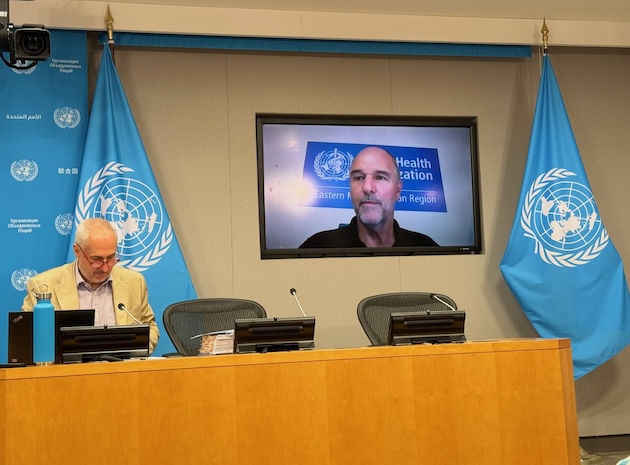
UNITED NATIONS, Aug 29 (IPS) – The UN’s multi-agency polio vaccination campaign in Gaza will begin this weekend amid continued restrictions on humanitarian operations and mobility, but with Israel’s assurances that it will cease fighting so the campaign can continue.
Rik Peeperkorn, the World Health Organization (WHO) Representative for Palestine, virtually briefed reporters on Thursday, August 29, 2024, about the upcoming polio vaccine campaign. The campaign will consist of two rounds, with the first round starting on September 1.
There will be a four-week interval between the first and second doses. More than 1.26 million doses of the polio vaccine have arrived in Gaza, with room for an additional 400,000 doses. The campaign, coordinated by WHO, UNICEF, UNRWA and the Palestinian Ministry of Health, will aim to administer two drops of the new oral polio vaccine type 2 (nOPV2) to at least 640,000 children under the age of 10.
“It is critical that we reach 90 percent vaccination coverage in each round,” Peeperkorn said. “That is necessary. In fact, you need 90 percent to stop the outbreak, the transmission within Gaza and the international spread of polio.”
The first round of the campaign will be carried out in three zones in three-day phases: starting in central Gaza, then southern Gaza and northern Gaza. With continued monitoring of the situation, one or two more days may be added to extend each period in the zones, Peeperkorn said. Even with this period, there is still pressure to carry out the campaign as quickly as possible to ensure the highest possible coverage.
Health centers have been set up where families can gather with their children. More than 2,180 outreach workers and volunteers have been trained to administer the vaccine, and mobile teams have been set up to travel to groups who may not be able to attend the centers.
“We want to make sure that we have the best possible access for three days, that families bring their children to those fixed locations,” Peeperkorn said. “We go out and reach people through mobile teams.”
Since the campaign was announced in early August, WHO has requested a humanitarian pause to allow operations to proceed safely. According to Peeperkorn, an agreement has been reached with the Office of the Coordinator of Government Activities in the Territories (COGAT), in which a humanitarian pause would be in effect for nine hours from 6 a.m. to 3 p.m.
According to the agreement, the campaign must be carried out within the time frame. Peeperkorn stated that the humanitarian pause would be respected and received assurances from Israeli authorities that no evacuation orders would be issued during the campaign.
“I want to emphasize that without a humanitarian pause, the implementation of the campaign, which is already being carried out under restrictions in a complex environment, will not be possible,” Peeperkorn said.
When asked how confident he was of the campaign’s success, Peeperkorn replied: “I think this is a way forward. I won’t say this is the ideal way forward, but this is a workable way forward. Doing nothing would be really bad. We have to stop this transmission in Gaza… We are reasonable with this approach and everyone is playing accordingly.”
“Of course, all parties must adhere to this. We must ensure that we can conduct this campaign every day during this humanitarian pause.”
Gaza and the West Bank have high vaccination rates among their populations. Peeperkorn noted that the vaccination rate of over 95 percent in recent years was much higher than in some high-income countries.
But since the outbreak of current hostilities in October 2023, polio vaccination coverage has fallen from 99 percent in 2022 to less than 90 percent in the first quarter of 2024.
Over the past ten months, blockades of humanitarian aid, electricity and water sources have led to a collapse of Gaza’s health and sanitation systems. The lack of clean water and sanitation in Gaza has already led to an increase in respiratory diseases and infections.
IPS UN Office Report
Follow @IPSNewsUNBureau
Follow IPS News UN Bureau on Instagram
© Inter Press Service (2024) — All rights reservedOriginal source: Inter Press Service







